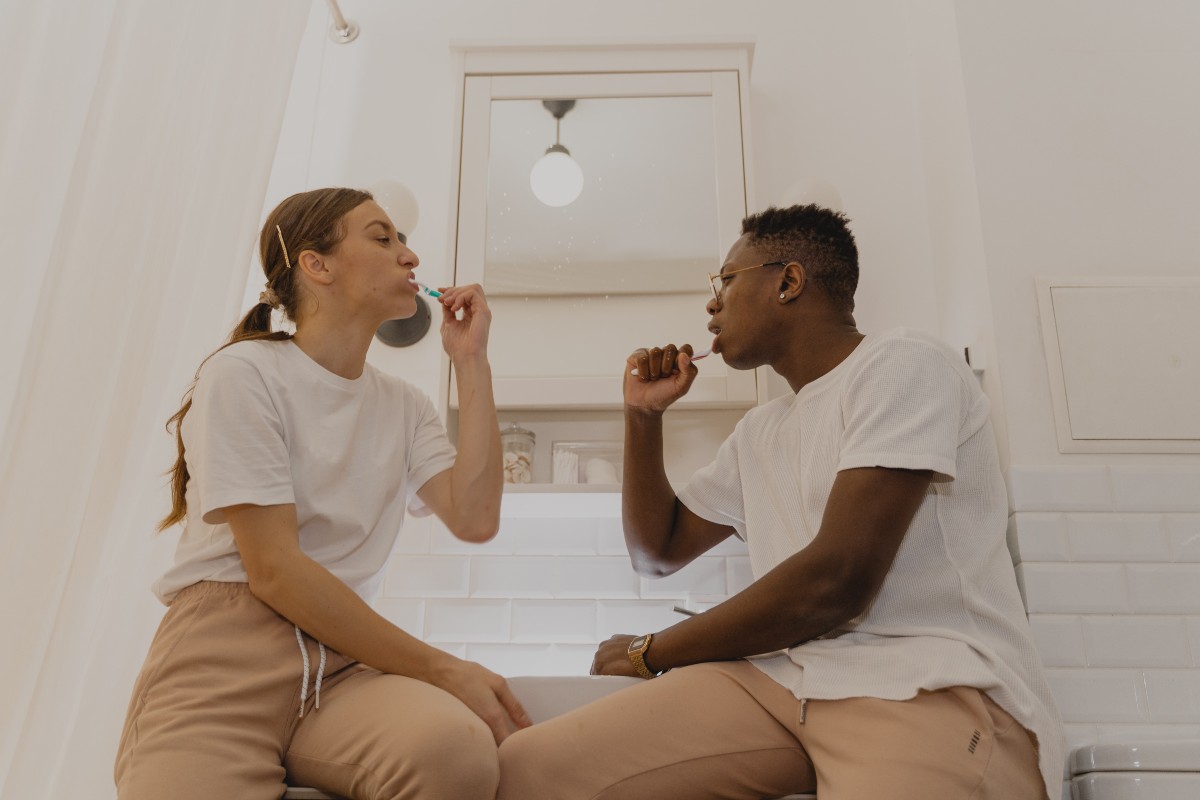
Remember 2020, when life went virtual and everything from morning huddle-ups to happy hours shifted to Zoom? It’s been a while (thankfully). It certainly had its drawbacks — mainly, many humans crave in-person interactions and socialization by nature. However, there was a hidden bonus: You didn’t have to deal with anyone’s bad breath or worry that someone else was dealing with yours.
Bad breath, also called halitosis, is an annoying condition. It happens to the best of us. Common causes of bad breath include eating certain foods, such as fish or something seasoned with garlic. More than pesky, it can also be embarrassing and lower self-esteem, according to one study. Sometimes, bad breath can even be a sign of something more concerning.
That said, more often than not, the condition is treatable. Here’s what to know about how to get rid of bad breath.
What are the causes of bad breath?
No one is immune to bad breath. Some causes are more common than others, and not all reasons for bad breath are preventable.
Bacteria trigger bad breath. It grows in the mouth, often on the teeth or tongue. Poor oral hygiene — like not brushing or flossing and skipping regular dental check-ups and cleanings — is the most common culprit of bad breath. These poor habits allow the bacteria to multiply and trigger halitosis in addition to other oral issues like cavities and gum disease.
Other causes include:
- Food choices: Fish, garlic, and onions are some of the more potent-smelling food products on menus.
- Gum disease: Often a byproduct of poor oral hygiene, gum disease, also called gingivitis, happens when the gums become inflamed. It’s caused by plaque, which can cause bad breath. The good news is that it can be treated with a combination of brushing and flossing twice daily and regular cleanings by a dentist.
- Dry mouth: Saliva serves as a natural cleanser for the mouth. Without it, bad breath can form.
- Smoking: Smoking can cause dry mouth, increase your chances of developing gum disease, and cause dry mouth, all common causes of bad breath.
- Medical conditions: Diabetes, liver disease, gastroesophageal reflux disease (GERD), and some cancers are among the conditions that can increase your risk of bad breath.
What are harmful types of bad breath smell?
If you notice these types of bad breath smells frequently after not consuming these types of foods, call a doctor:
- Rotten egg: This smell can signal you’re having digestive issues, like GERD.
- Fruity or sweet: Sometimes, these smells are a sign of ketoacidosis — a diabetes complication — or kidney failure.
- Mold or fungus: These smells can be the result of a sinus infection, which causes thick mucus to develop and drip from your nose to the back of the throat. All of that build-up can cause you bad breath as you inhale and exhale.
- Fecal: Fecal-smelling breath is a symptom of bowel obstruction. You’ll want to call a doctor ASAP for a check-up.
- Fish: If you didn’t opt for salmon for lunch and notice a fishy smell when you’re breathing, it might be a sign you have a kidney issue.
Why does my breath stink even after brushing?
If you just brushed your teeth and still feel like your breath stinks, it’s understandably frustrating. Unfortunately, poor oral hygiene over long periods can have a cumulative effect. It may cause tooth decay and gum disease, which can make it more challenging to attain and maintain fresh breath. A dentist can help you get your tooth decay and gum disease under control. Consistent oral hygiene moving forward should improve the issue.
How to get rid of bad breath (and prevent it in the first place)
Get fresh breath in a snap and ward off halitosis long-term with these top tips.
- Brush and floss regularly. The American Dental Association (ADA) guidelines recommend brushing for two minutes per day, twice per day, every day, with a soft-bristled toothbrush. Don’t forget the tongue, where bacteria often build up. Be sure to floss as well.
- Use mouthwash. Using mouthwash after your brush-and-floss routine can reduce oral bacteria and leave your breath smelling minty fresh.
- Mints or gum. Mints or gum can temporarily mask bad breath, but they’re not a replacement for regular brushing. Choose sugar-free types, as sugar can cause oral issues like cavities.
- Avoid certain foods. Listen, fish is nutritious and delicious, and garlic and onions can make food tasty. However, avoiding these foods in public settings can help you avoid bad breath. They simply may not be the best choice during a work meeting, especially if you plan to do a lot of gabbing.
- Don’t smoke. Smoking causes a host of issues, including bad breath.
- Hydrate. Sip water throughout the day to nix dry mouth.
- Visit the dentist. Regular cleaning prevents plaque build-up and plays an important role in halitosis prevention. A dentist can also give you more tips about preventing bad breath.
- Take medications as directed. If you have specific conditions, such as diabetes, taking medications can keep you healthy and, as a fantastic bonus, give you fresh breath.
- See a doctor. Talk to a doctor if you’re not having luck nixing bad breath with more traditional remedies or if you note smells that are symptomatic of a medical condition They can run tests and provide more tips and advice.
Wanting fresh breath is understandable — and your suitemates at work and lunch crew will thank you if you achieve these goals. Bad breath is typically the cause of poor oral hygiene or simply eating something particularly smelly (but hopefully delicious). Twice daily brushing and flossing— perhaps an extra session if you had fish for lunch — can help you ward off bad breath. Dentists can do more thorough cleanings and flag issues like gum disease that can also contribute to bad breath. Rarely, halitosis is the sign of something more concerning. Speak with a doctor if you notice specific smells such as fish (if you haven’t eaten it), feces, rotten eggs, mold, or fruit/sweets. Your doctor can rule out any underlying condition.
Editors' Recommendations
- The 15 best 2-in-1 shampoo and conditioners to shorten your shower time
- Is coffee bad for teeth? Dentists explain how you can keep your pearly whites healthy
- How to properly use an electric toothbrush
- Is an electric toothbrush worth the cost? Experts weigh in
- How to whiten teeth at home: A guide to natural and OTC remedies for pearlier whites







